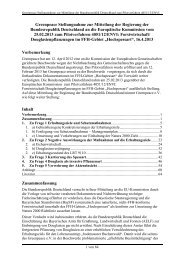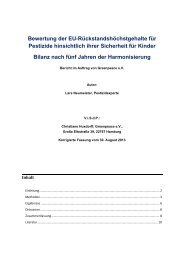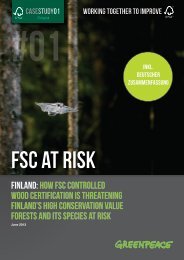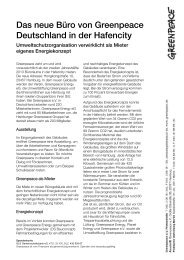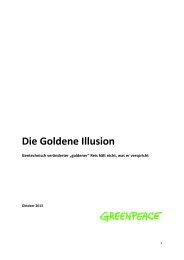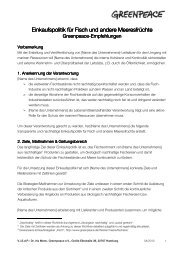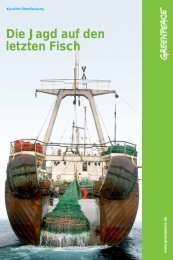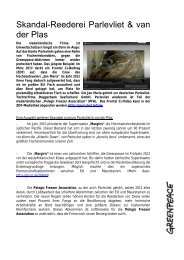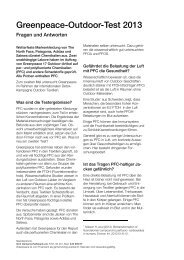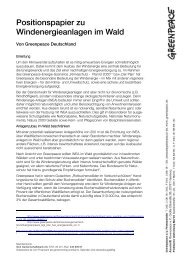HOW THE PALM OIL INDUSTRY IS - Greenpeace
HOW THE PALM OIL INDUSTRY IS - Greenpeace
HOW THE PALM OIL INDUSTRY IS - Greenpeace
You also want an ePaper? Increase the reach of your titles
YUMPU automatically turns print PDFs into web optimized ePapers that Google loves.
58<br />
defuse<br />
or<br />
detonate?<br />
‘The simplest and most<br />
effective measure to prevent<br />
a further increase in fires and<br />
CO 2<br />
emissions is thus by<br />
conservation of remaining<br />
peat swamp forests and<br />
rehabilitation of degraded<br />
peatswamp forests.’<br />
Wetlands International, 2006<br />
NASA climate scientists warn us that ‘continued rapid growth<br />
of CO 2<br />
emissions and infrastructure for another decade’<br />
may make halting high-risk increase in global temperatures<br />
‘impractical if not impossible’. 382<br />
Developing countries with tropical rainforests – such as<br />
Indonesia and Brazil – do not have targets for emissions<br />
reductions under the Kyoto Protocol. There is no international<br />
financing mechanism to support them in reducing their<br />
emissions from deforestation, although countries that are<br />
signatories to the UN Convention on Climate Change have<br />
made a general commitment to protect and conserve the<br />
world’s carbon reservoirs. 383<br />
While international climate negotiations in 2007 are<br />
opening discussions on ways to reduce emissions from<br />
deforestation, global commodity traders continue to expand<br />
commodity infrastructure into the world’s rainforests. Once<br />
such infrastructure is in place, stopping the ‘rapid growth<br />
of CO 2<br />
emissions’ linked to rainforest destruction becomes<br />
‘impractical if not impossible’.<br />
Faced with impending climate catastrophe, the palm oil<br />
industry is speculating on the predicted growth in global<br />
demand for vegetable oil by grabbing valuable, available<br />
cheap land – ie Indonesia’s carbon-rich peatland and<br />
rainforest – and building infrastructure, including palm<br />
oil refineries and biodiesel plants.<br />
By maintaining a business-as-usual relationship with<br />
commodity traders, the big food giants like Unilever and<br />
Nestlé are supporting the ‘rapid growth of CO 2<br />
emissions<br />
and infrastructure’ that may render halting dangerous<br />
climate change ‘impractical if not impossible’.<br />
Just as perverse are political strategies for reducing emissions<br />
from transport. National energy policies and current emissions<br />
accounting incentivise this infrastructure development.<br />
In an effort to reduce their own emissions, oil dependent<br />
countries are striking deals with oil palm companies in<br />
Indonesia – for instance, Sinar Mas’ partnership with the<br />
Chinese National Offshore Oil Corporation. This trade<br />
amounts to emissions transfer not emissions reduction:<br />
emissions linked to palm oil production, such as forest<br />
clearance and peatland destruction, are attributed to the<br />
producer country. Unlike Annex I signatories to the Kyoto<br />
treaty, Indonesia – as a developing country – is not required<br />
to set a target to reduce its GHG emissions.<br />
Consequently, since the Kyoto Protocol does not provide<br />
incentives to prevent the destruction of tropical forests, the<br />
expansion of oil palm into carbon-rich landscapes such as<br />
peatlands and forests makes huge short-term economic<br />
sense, but no ecological sense.<br />
Urgent action and cooperation is needed on a global level<br />
to shift the economic drivers of society. As NASA’s climate<br />
scientists observe: ‘The task is to achieve a transition to clean<br />
carbon-free energy sources without pushing the climate<br />
system beyond a level where disastrous irreversible effects<br />
become inevitable.’ 384<br />
The debate is not whether we need to reduce emissions<br />
from fossil fuels in the industrialised world or whether we<br />
should stop deforestation in the remaining forests of the<br />
developing world. The inescapable reality is that we must<br />
do both, and soon.<br />
At the same time, growing global demand for vegetable<br />
oil for food combined with current landgrabbing by biofuel<br />
interests – many of them RSPO members – is significantly<br />
increasing the pressure on the world’s threatened rainforests<br />
and other vulnerable habitats. Continuing clearance of<br />
tropical rainforests for agricultural commodity crops like<br />
oil palm seems inevitable unless action is taken now by<br />
industry and governments.



